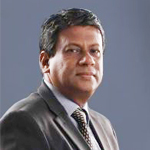Beyond Engineering...
Featured Article by an Invitee Non-engineering Professional
The Role of Local Engineers from a Non-engineer’s Perspective
 Mr. Saman Warusavithana is the Immediate Past President of OPA Sri Lanka, and he was the 43rd General Secretary of OPA. Further he is the current Vice President of Sri Lanka Institute of Agriculture. He got his BSc. degree from University of Ruhuna in 1987 in Agriculture Engineering. Mr. Warusavithna obtained his PG qualifications in Environmental Engineering from University of Moratuwa and in Business Administration from University of Colombo. He is presently a Plant protection and Environmental Health Consultant and the Chairman of John Piper International (Pvt) Ltd.
Mr. Saman Warusavithana is the Immediate Past President of OPA Sri Lanka, and he was the 43rd General Secretary of OPA. Further he is the current Vice President of Sri Lanka Institute of Agriculture. He got his BSc. degree from University of Ruhuna in 1987 in Agriculture Engineering. Mr. Warusavithna obtained his PG qualifications in Environmental Engineering from University of Moratuwa and in Business Administration from University of Colombo. He is presently a Plant protection and Environmental Health Consultant and the Chairman of John Piper International (Pvt) Ltd.
The word “engineer” conjures up a wide variety of ideas, specifically from an individualistic perspective for those who are not directly involved in the engineering profession itself. For some it can mean buildings, skyscrapers and monuments, while to others it may mean automobiles, machines and robots, and yet others envision computers, space exploration and cutting edge technology. What is fascinating is the fact that engineering actually encompasses all these, and much, much more.
To put it plainly, engineering takes two theoretical subjects, math and physics, and combines them together to give a practical, applicable outcome. This might be the simplest way to define the term engineering. Combining these two fundamental sciences with other sciences such as chemistry and biology, and striving to apply their theories into the real world to create something new and beneficial for mankind is what I imagine engineering to be all about. Beginning from cavemen designing and building simple tools and shelters to improve their quality of life, to the great Greek and Roman architects constructing convenient roads and aqueducts and beautiful palaces and arenas, and to today’s engineers pushing the boundaries of the knowledge they have to create and discover more, the subject of engineering has advanced exponentially, with one simple goal; to create a better, safer, healthier, easier, productive life for us humans, as well as the world we inhabit and ensure that these developments are passed onto future generations.
Sri Lanka might be a small nation, but in our degree of scientific knowledge and ingenuity, small we are not. Our long history has shown us evidence of brilliant men and capable engineers who have constructed architectural marvels imbued with their advanced expertise in mathematics and physics, resulting in wonders which have lasted through the centuries till this day. The reservoir tanks for the uninterrupted supply of water for agriculture, the rock fortresses and palaces for defense and luxurious living, and the temples venerating religions, are all magnificent illustrations of their capabilities. But they have not stopped there. These ancient developments still baffle experts as how such knowledge was available at that time. Sri Lankan engineers are at the forefront of the futuristic creative and scientific discoveries in various fields of engineering – given that the diversity has expanded exponentially; such as in civil engineering (various buildings, monuments and sculptures around the world), mechanical engineering (machines, automobiles and weapons tech) as well as medicine (Bio-medical) and space exploration.
The Institution of Engineers, Sri Lanka, being an important part in the Organization of Professional Associations, gives credence and inputs, creativity, and the logical framework to uphold the objectives of the OPA as a whole, and provides the wherewithal to give realistic and professional advice which also leads to exchange of ideas and methodologies for continuing our placement as an advisory body which also connects the 52 Member Associations, and 32 Professions under one umbrella. As a member of the scientific community but a non-engineer, there are a few factors which I would like engineers to take a pause and ponder about.
All members of the scientific community have a quest for knowledge. In this, engineers are not exempt. But with engineering being an applied science, there is an inclination of engineers to move towards practicality rather than dealing with theories. However, it is to be noted that in the recent years, engineers seemed to have moved from using a pragmatic approach incorporating sustainable development and environmentally friendly practices, to a more futuristic globalization based operating model. While this may be seen as keeping up with the times, it is important to remember that Sri Lanka is still a small, developing country with limited resources, with a dire need to improve the basic standards of living for its citizens. Taking these factors into consideration, it would be prudent for engineers to revisit and follow a path that primarily targets solving social- economic issues on the said same pragmatic basis, to provide urgent practical solutions to enhance their wellbeing. It does not imply to imprison your imagination or to stifle your creativity, but rather to use them to address the very real issues at hand. What good is building monuments which can touch the sky, when there are people who are homeless at your doorstep? What is the immediate use for exploration of the universe and searching for extraterrestrial forms of life, when you cannot improve the quality of life of your fellow countrymen? Why the need for space colonization when you could still do something to improve and conserve our own planet? The models we follow and the goals we set might not be pertinent to our country and its people, at least at this point in history. It might be wiser to start smaller and first try to solve the issues at hand, then proceed to set bigger goals. A man could gaze at the stars and dream, just so as long as he first learns to live on Earth. Even when attempting to design and build innovations for our country, we still try to follow and keep up to international standards and regulations. Considering our needs and available assets, this is actually quite unnecessary, until we actually progress and reach those standards of the countries which issue such regulations. We have to learn to walk before we can run.
Engineers are still human, however amazing and remarkable they may appear. It is understood that fame and money are two of the key motivational factors for engineers to do what they do, as it is in many other fields. Without a notable discovery, invention or creation there is no fame, and without fame there is no money, and without money there can be no further research and development. But together as one unified entity, engineers can collaborate together with each other as well as with other spheres of science, to break the bonds of human greed for power and control and to in fact, come back to their fundamental belief: to ensure a better quality of life to society as a whole and specially those who require the basics of socio-economic upliftment. The primitive man of the stone age did not build weapons out of stones just so future generations could marvel at their intellect. Nor did the Roman engineers build roads for us to use. I do not believe that Nikola Tesla invented some of the most important and widely used machines to flaunt his IQ nor do I believe that Dr. Ray Wijewardene devised the walking tractor for financial gain. They did these simply because we needed it in order to improve our quality of life and raise our standards of living at that point in history.
Engineers might be restricted by certain financial or ideological constraints. Superpowers may impose a doctrine of globalization with the appearance of improving the world for all, but in fact using it as a cover to exploit poorer people. Affluent banking families use their money and influence to subdue all research and development into certain areas which might be a threat to their wealth. These are some of the very real hazards which engineers might come to face in the course of their pursuit for a better world. Engineers might be unable to overcome all of these hurdles on their own, but by collaborating with other professions and working together as a team towards achieving a common goal, to identify, analyze, interpret, and apply the process of critical thinking in solving our country’s problems is what we strive ardently to achieve as an unfettered objective for at the Organization of Professional Associations.





